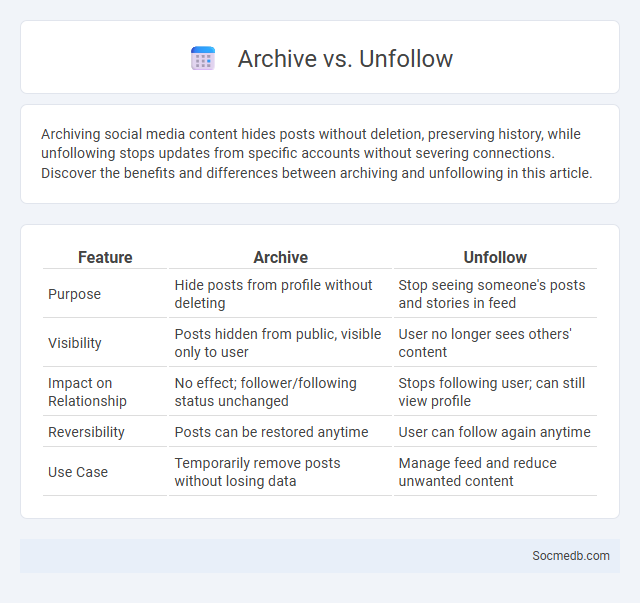
Photo illustration: Archive vs Unfollow
Archiving social media content hides posts without deletion, preserving history, while unfollowing stops updates from specific accounts without severing connections. Discover the benefits and differences between archiving and unfollowing in this article.
Table of Comparison
| Feature | Archive | Unfollow |
|---|---|---|
| Purpose | Hide posts from profile without deleting | Stop seeing someone's posts and stories in feed |
| Visibility | Posts hidden from public, visible only to user | User no longer sees others' content |
| Impact on Relationship | No effect; follower/following status unchanged | Stops following user; can still view profile |
| Reversibility | Posts can be restored anytime | User can follow again anytime |
| Use Case | Temporarily remove posts without losing data | Manage feed and reduce unwanted content |
Understanding Archive, Unfollow, and Delete: Key Differences
Understanding the key differences between Archive, Unfollow, and Delete on social media is crucial for managing your online presence effectively. Archiving allows you to hide posts temporarily without losing them, Unfollowing stops content from specific accounts appearing in your feed while maintaining connections, and Deleting permanently removes content or contacts from your profile. You can use these tools strategically to curate your digital space, control your privacy, and enhance your social media experience.
What Does “Archive” Mean on Social Media?
The term "archive" on social media refers to the feature that allows you to hide posts from your profile without deleting them, preserving content privately for future access. Archived posts remain visible only to you, enabling easy retrieval or restoration when desired. This function helps manage your online presence while maintaining control over your shared history.
The Purpose of the “Unfollow” Feature
The "Unfollow" feature on social media enables You to streamline your feed by removing unwanted content without disconnecting from accounts. This tool helps maintain mental well-being by reducing information overload and exposure to negative or irrelevant posts. Users gain control over their social media experience, promoting a healthier and more personalized online environment.
Pros and Cons of Archiving Content
Archiving content on social media preserves valuable posts, enabling easy access to past campaigns and maintaining a brand's history, which supports long-term strategic analysis and compliance with data retention policies. However, archived content can accumulate rapidly, requiring significant storage resources and potentially exposing sensitive information if not properly managed or secured. Balancing the benefits of organized content retrieval with the risks of data overload and privacy concerns is essential for effective social media management.
When Should You Unfollow Versus Archive?
You should unfollow accounts that no longer align with your interests or values to maintain a meaningful social media feed. Archiving posts is beneficial when you want to hide content temporarily without deleting it, preserving memories discreetly. Your social media experience improves by regularly evaluating which accounts and posts add value to your online engagement.
How Archiving Affects Your Online Visibility
Archiving your social media content preserves valuable posts, enhancing your online visibility by keeping important information accessible to your audience. Properly archived content allows search engines to index your posts effectively, improving your profile's ranking in search results. You can maintain a consistent digital presence that attracts engagement and builds trust with followers over time.
Managing Relationships: Unfollow vs Archive Strategies
Managing relationships on social media requires strategic decisions between unfollowing and archiving to maintain a curated feed and mental well-being. Unfollowing eliminates content from your feed entirely, reducing digital noise and improving focus on meaningful interactions, while archiving hides posts without severing the connection, preserving the relationship for potential future engagement. Choosing between these methods depends on the desired level of social presence control and long-term engagement goals in platforms like Instagram, Facebook, and Twitter.
Impact on Privacy: What Happens After You Archive or Unfollow?
Archiving or unfollowing on social media platforms can significantly influence your digital privacy by changing what data remains visible to others and what is stored by the platform. While archiving typically hides content from your profile but keeps it accessible to you and the platform's data systems, unfollowing reduces the interaction with another user's content, potentially limiting data sharing and exposure. Despite these actions, most platforms continue to collect and analyze user behavior data for targeted advertising and algorithmic personalization, underscoring limited control over privacy post-engagement changes.
Best Practices for Social Media Cleanup: Archive or Unfollow?
Regular social media cleanup enhances your online presence by organizing content and refining your follower list. Prioritize archiving posts to preserve valuable memories without cluttering your profile, while unfollowing inactive or irrelevant accounts improves your feed's quality and engagement. Your strategy should balance maintaining meaningful connections and curating a focused, relevant social media experience.
Choosing the Right Option: Archive, Unfollow, or Delete?
Choosing between archiving, unfollowing, or deleting on social media depends on your personal goals and content preferences. Archiving allows you to hide posts without losing them, maintaining your digital history intact. Unfollowing controls your feed by stopping updates from certain accounts without severing connections, while deleting permanently removes content you no longer wish to share, giving you full control over your online presence.
 socmedb.com
socmedb.com